

Social Media Security - EdgeWave.com. Unleashing the Power of Social Media Countless businesses are finding that using social networking sites can enhance their connection to their markets, with their partners and vendors and among their employees.
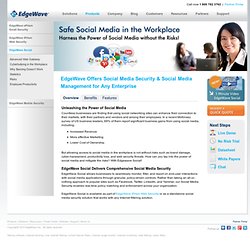
In a recent McKinsey survey of US business leaders, 69% of them report significant business gains from using social media, including: Increased Revenue More effective Marketing Lower Cost of Ownership But allowing access to social media in the workplace is not without risks such as brand damage, cyber-harassment, productivity loss, and web security threats. Next step: Crowd-source digital citizenship. I question it even as I’m preparing for talks on the subject in several countries this coming fall….
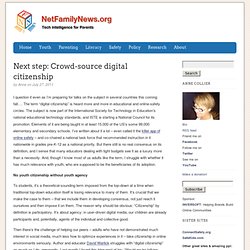
The term “digital citizenship” is heard more and more in educational and online-safety circles. The subject is now part of the International Society for Technology in Education’s national educational technology standards, and ISTE is starting a National Council for its promotion. Elements of it are being taught in at least 15,000 of the US’s some 99,000 elementary and secondary schools. Digital citizenship reality check: Notes from Nairobi's IGF. Asked how they’d rank “digital citizenship” on a scale of 1 to 10 – with 10 representing “very relevant and meaningful” – a youth panel from Egypt, the US, and UK ranging in age from 15 to 22 gave it a 1, two 3′s, a 5, a 6, and an 8.
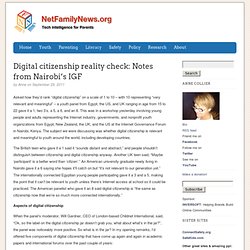
This was in a workshop yesterday involving young people and adults representing the Internet industry, governments, and nonprofit youth organizations from Egypt, New Zealand, the UK, and the US at the Internet Governance Forum in Nairobi, Kenya. The subject we were discussing was whether digital citizenship is relevant and meaningful to youth around the world, including developing countries. The British teen who gave it a 1 said it “sounds distant and abstract,” and people shouldn’t distinguish between citizenship and digital citizenship anyway. Another UK teen said, “Maybe ‘participant’ is a better word than ‘citizen’.”
Aspects of digital citizenship Consensus a ways off Other highlights & takeaways Related links. Sample School Theatre Department Social Media Plan « ArtsIntersect. A Little Common Sense. Kids and teachers are interacting.
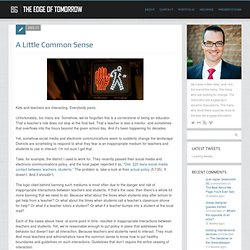
Everybody panic. Unfortunately, too many are. Somehow, we’ve forgotten this is a cornerstone of being an educator. That a teacher’s role does not stop at the final bell. That a teacher is also a mentor, and sometimes that overflows into the hours beyond the given school day. Districts Tackle Questions Surrounding BYOT Policy. Schools Open Doors to Students' Mobile Devices. Framework Crafted for Student Use of Mobile Devices. Published Online: November 9, 2010 Published in Print: November 10, 2010, as Framework Crafted for Student Use of Computing Devices Education policy center addresses issues around proper and improper use As school districts across the country grapple with the benefits and risks of incorporating cellphones, media players, and tablet computing devices into school life, one research group is offering up a framework it hopes will serve as a vehicle to help address student use of those devices.
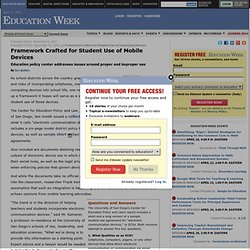
The Center for Education Policy and Law, based at the University of San Diego, last month issued a collection of documents on what it calls "electronic communication devices," or ECDs, which includes a six-page model district policy that outlines proper and improper use of the devices, as well as sample short. Crowdsourced School Social Media Policy Now Available.
I’ve been seeing a lot of people on social media looking for a social media policy and / or an acceptable use policy. So I offered to help spearhead an initiative where some of our amazing readers could help craft these policies from scratch. It started out very basic but, 400 edits later, has materialized into a thoughtful and well-organized document that’s a great template for any school. It may not be perfect for you, but use this as a jumping-off point to get your own policy started. Want to edit the living document? Click here to view it in Google Docs. www.edutopia.org/pdfs/edutopia-anderson-social-media-guidelines.pdf. How to Create Social Media Guidelines for Your School. Creating Social Media Guidelines for Educators - ASCD Annual Conference 2012. Christine Fisher More videos are uploaded to YouTube in 60 days than the combined number NBC, ABC, and CBS have produced in 60 years, and yet many schools restrict students from accessing this world of information.
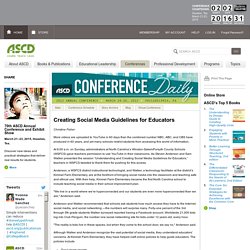
At 6:00 a.m. on Sunday, administrators at North Carolina’s Winston-Salem/Forsyth County Schools (WSFCS) gave teachers permission to use YouTube in their classrooms. As Steven Anderson and Sam Walker presented the session “Understanding and Creating Social Media Guidelines for Educators,” teachers in WSFCS tweeted to thank them for pushing for this access. Anderson, a WSFCS district instructional technologist, and Walker, a technology facilitator at the district’s Kimmel Farm Elementary, are at the forefront of bringing social media into the classroom and teaching safe and ethical use. With their help, Kimmel Farm Elementary became the first North Carolina school to include teaching social media in their school improvement plan.
AUPs shape Web 2.0 use, guidelines. CoSN hopes to help schools transition from 'acceptable use' to 'responsible use' By Jenna Zwang, Assistant Editor Read more by Jenna Zwang CoSN's guidelines are a resource for district leaders rewriting Web 2.0 policies. As educational technology transforms teaching and learning, many districts are finding that once-solid acceptable use policies (AUPs) must be updated to reflect students’ and teachers’ increasing use of Web 2.0 technologies and other digital media tools. To that end, the Consortium for School Networking (CoSN) has released an AUP guide to help school district leaders rethink their internet use policies and how educational technology can best be used to help students get the most out of their time in school. The new guide addresses the following questions: Student Acceptable Use Agreement - Consent Forms and Templates - Learning On Line. dl.dropbox.com/u/11220586/Social_Media_Guidelines_DePaul%20University.pdf.
Social Media Blunders and Job Search. As most of you already know we tend to cover social media quite often. We think social media and job search are directly related in today’s fast paced world. Although the use of social media has become a must for networking purposes, it seems like many still don’t see the pitfalls. When you are using these different platforms to share your work frustration , you need to realize that your network also has an extended network. You may not have your boss or employer as friend or follower, but there might be someone else who is ready to rat you out. Be careful, the job search and career space is not what it used to be. The “Boss Hating” Type Last month we posted an image on how someone got fired when she ended up bad mouthing her boss on Facebook. Source. HRBot: Human Resource Robot That Spiders Your Social Profile. Looking to create a social media or BYOD policy? Look no further. When we block social media we block learning. DIY Guide to Keeping Children Safe Online Without Costly Filters.
Student Safety in the Age of Facebook. Online Safety | In Print Student Safety in the Age of Facebook By Margo Pierce03/02/12 "If one life is saved, then it's worth it.
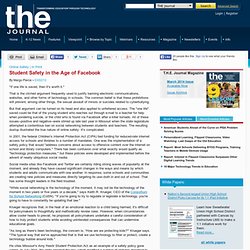
" That is the clichéd argument frequently used to justify banning electronic communications, websites, and other forms of technology in schools. The common belief is that these prohibitions will prevent, among other things, the sexual assault of minors or suicides related to cyberbullying. But that argument can be turned on its head and also applied to unfettered access. In 2001, the federal Children's Internet Protection Act (CIPA) tied funding for reduced-rate internet access for schools and libraries to a number of mandates. Social media doesn’t “cause” unprofessional or inappropriate behavior. It “catches” it. Something interesting has been happening across schools and districts in response to online safety concerns.
Instead of empowering and teaching students how to harness the power of the internet and social media they are banning teachers from interacting with teachers in online spaces like Facebook. These misguided schools and districts like this one in Ontario tell educators, students, and parents that, Not Everyone is Jumping on the Banned Wagon. The Innovative Educator tries to change the mind of an administrator who “thinks” he disagrees with my stance on friending students online.
When George Swain read my Tweet, “Told the mayor on his Facebook page, he was inappropriate for judging teachers who friend students he replied with this: georgeswain @InnovativeEdu Very interesting issue!
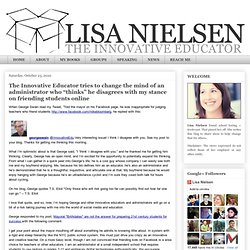
I think I disagree with you. See my post to your blog. Thanks for getting me thinking this morning. What I’m optimistic about is that George said, “I ‘think’ I disagree with you.” and he thanked me for getting him thinking. A thoughtful comment indeed. @George Swain, I’d like to know what you perceive as the dangers for an educator open to connecting with students in whichever environment they exist...online or offline. So, George, I’m dying to know. Not Letting Teachers “Friend” & “Follow” Kids Online? Think Twice! Almost 70% of 18-34 year-olds expect 2012 presidential candidates to have a social media presence (Digitas, 2011).
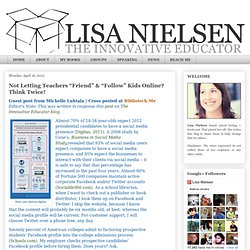
A 2008 study by Cone’s, Business in Social Media Study,revealed that 93% of social media users expect companies to have a social media presence, and 85% expect the businesses to interact with their clients via social media – it is safe to say that that percentage has increased in the past four years. Almost 60% of Fortune 500 companies maintain active corporate Facebook and/or Twitter accounts (Sociable360.com). As a school librarian, when I want to check out a publisher or book distributor, I look them up on Facebook and Twitter. I skip the website, because I know that the content will probably be six months old, at best, whereas the social media profile will be current.
For customer support, I will choose Twitter over a phone tree, any day. What are we doing to prepare students to function in this landscape? So yes. We are in the business of education. The World's Simplest Social Media Policy. 11 Lies Social Media Hides. Social media impacts lives.

When you have someone in a controversial matter like the wrong thing or say the wrong thing it can cause a snowball that can influence and even harm. I've seen this first hand. I know people who've lost jobs, seen marriages destroyed, and organizations teeter on the brink of nonexistence through poorly thought-out likes, unfriending, and comments.